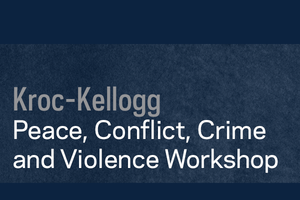Kroc-Kellogg Peace, Conflict, Crime and Violence Workshop

“Don’t We Have a Right to Get Angry? Integrating Emotions into the Rational Choice Theory of International Mediation”
Laurie Nathan, Professor of the Practice of Mediation; Mediation Program Director, and Joel Devonshire, Ph.D. student in Peace Studies and Psychology
Discussant: Andy Owsiak, former Kroc Institute Visiting Research Fellow (Fall 2021)
The dominant theoretical framework in the literature on international mediation is rational choice theory (RCT), which assumes that conflict parties decide whether to pursue a negotiated settlement or continue fighting on the basis of a rationalist assessment of the expected utility and costs of these options. This assumption limits the explanatory and predictive power of RCT because emotions influence and are intertwined with cognitive processes and they have particular salience in conflict situations. We argue that emotions are significant causal mechanisms in the conflict parties’ assessments and decisions regarding negotiations. A more realistic theoretical framework should therefore incorporate the parties’ emotions. More specifically, it. should view the core RCT concepts of utility, costs, benefits, defeat and victory in terms of both rationalist and emotional considerations. We ground this argument in the psychology literature on conflict and emotions. We illustrate the argument through a case study of the 2000 Camp David negotiations on the Israel-Palestine conflict.
Open to Ph.D. students, fellows, and faculty who are interested in civil war, violence, crime, peace, conflict management, and conflict resolution. The workshop is an informal gathering to discuss work-in-progress, dissertation chapters and proposals, practice conference talks, etc.
https://notredame.zoom.us/j/91591523585?pwd=RmlvQ2h6NEVhRSs2azFkYU8xaVptdz09
password: kkpccvw
The workshop format assumes that participants come to the workshop having read the paper. A discussant will start the discussion with 5-10 minutes of comments, then the floor is open.
Masking policy: All participants must be masked, with masking by presenters and discussants optional.